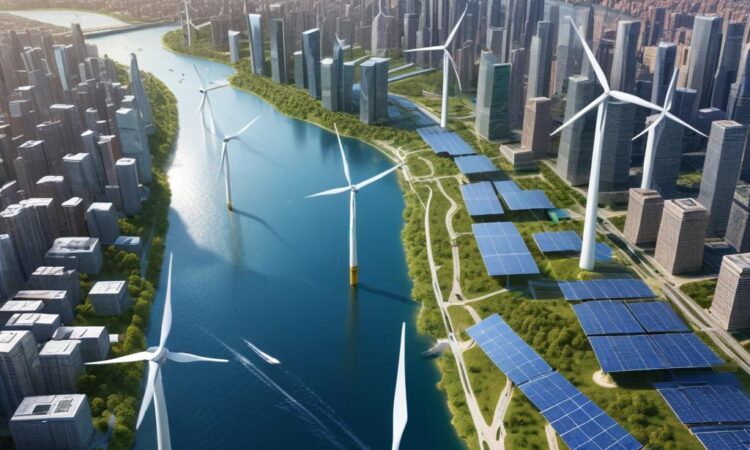Energy Transition and Investment: A Comprehensive Analysis
The global shift towards renewable energy sources is no longer a distant prospect; it’s a rapidly unfolding reality. Government policies worldwide are increasingly prioritizing the transition away from fossil fuels, creating a surge of investment in the green energy sector. This significant influx of capital is reshaping the energy landscape, presenting both unprecedented economic opportunities and considerable challenges. This report delves into the multifaceted nature of this energy transition, analyzing its economic implications, exploring the potential for job creation and displacement, and examining its impact on energy security.
Driving Forces Behind the Transition
Several key factors are propelling the global energy transition. Firstly, the increasingly urgent need to mitigate climate change is a primary driver. The scientific consensus on the detrimental effects of greenhouse gas emissions has spurred governments and businesses to embrace cleaner energy solutions. International agreements, such as the Paris Agreement, have further solidified this commitment, establishing targets for emissions reductions and promoting the adoption of renewable energy technologies.
Secondly, technological advancements have played a crucial role. The cost of renewable energy technologies, such as solar and wind power, has plummeted in recent years, making them increasingly competitive with fossil fuels. Improvements in energy storage technologies are also enhancing the reliability and viability of renewable energy sources, addressing one of their primary limitations. Furthermore, innovations in smart grids and energy efficiency measures are optimizing energy consumption and integration of renewable sources.
Finally, economic considerations are increasingly driving the transition. The renewable energy sector is creating numerous employment opportunities in manufacturing, installation, maintenance, and research and development. Moreover, investing in renewable energy infrastructure can stimulate economic growth and enhance energy independence, reducing reliance on volatile global fossil fuel markets.
Economic Opportunities and Challenges
The energy transition presents significant economic opportunities. The growth of the renewable energy sector is creating a wealth of new jobs, from manufacturing solar panels and wind turbines to installing and maintaining renewable energy systems. This growth is not limited to the energy sector itself; it extends to supporting industries such as construction, engineering, and finance. The development of renewable energy infrastructure also necessitates significant investment in grid modernization, smart grids, and energy storage solutions, further driving economic activity.
However, the transition also presents economic challenges. The shift away from fossil fuels could lead to job losses in the traditional energy sector, requiring workforce retraining and adaptation. The intermittent nature of some renewable energy sources, such as solar and wind power, requires robust energy storage solutions and grid management strategies to ensure energy reliability and security. Furthermore, the upfront investment costs associated with renewable energy projects can be substantial, requiring significant financing and investment.
Governments play a critical role in navigating these challenges. Strategic policy interventions, such as subsidies, tax credits, and carbon pricing mechanisms, can incentivize investment in renewable energy and mitigate the economic risks associated with the transition. Furthermore, targeted support for workforce retraining programs can help to ensure a smooth transition for workers in the fossil fuel sector. Careful planning and regulatory frameworks are crucial for effective grid integration and deployment of renewable energy technologies.
Implications for Employment and Energy Security
The energy transition has profound implications for employment. While it may lead to job losses in the fossil fuel sector, it is expected to create a significant number of new jobs in the renewable energy sector and related industries. The net impact on employment will depend on the speed and nature of the transition, as well as government policies aimed at supporting workforce retraining and job creation in the green economy. A well-managed transition can minimize job losses and maximize the creation of high-quality jobs in the renewable energy sector.
Energy security is another crucial aspect of the energy transition. Many countries rely heavily on imports of fossil fuels, making them vulnerable to price volatility and geopolitical instability. The transition to renewable energy sources can enhance energy security by diversifying energy supply, reducing reliance on fossil fuel imports, and promoting energy independence. However, ensuring energy reliability during the transition requires careful planning and investment in grid infrastructure, energy storage, and demand-side management strategies.
The integration of renewable energy sources into existing energy grids presents technical challenges, requiring upgrades and modernization to accommodate intermittent renewable energy generation. This requires substantial investment in grid infrastructure and smart grid technologies, enhancing the overall resilience and efficiency of the energy system. A secure and reliable energy supply is crucial for economic growth and social stability, making grid modernization a crucial aspect of the successful energy transition.
Policy Recommendations and Future Outlook
To effectively manage the energy transition, policymakers need to adopt comprehensive strategies that address both the economic opportunities and challenges. This includes implementing supportive policies to incentivize renewable energy investment, promoting innovation in renewable energy technologies, and providing targeted support for workforce retraining and job creation in the green economy. International collaboration is crucial for sharing best practices and accelerating the global shift towards a sustainable energy future.
Investing in research and development is crucial for driving down the cost of renewable energy technologies and improving their efficiency and reliability. This includes supporting the development of advanced energy storage technologies, smart grids, and other technologies necessary for a seamless integration of renewable energy sources into the energy system. Furthermore, fostering public awareness and engagement is essential to building public support for the energy transition.
The future of the energy sector hinges on the successful implementation of effective policies and investments in renewable energy technologies. The transition to a cleaner, more sustainable energy system presents both significant challenges and opportunities. By embracing innovative solutions, fostering collaboration, and implementing robust policies, we can create a future powered by renewable energy, driving economic growth, enhancing energy security, and mitigating the impacts of climate change.

